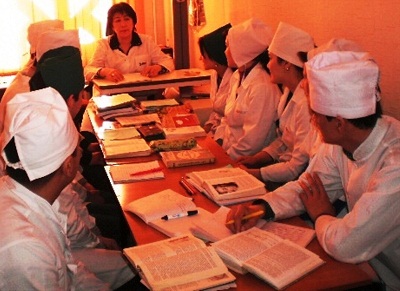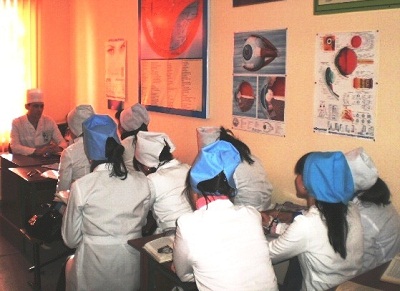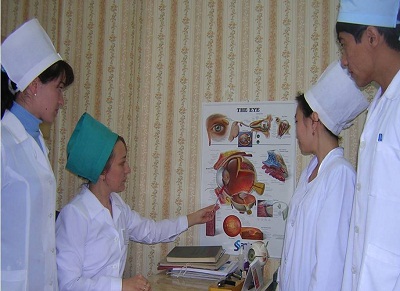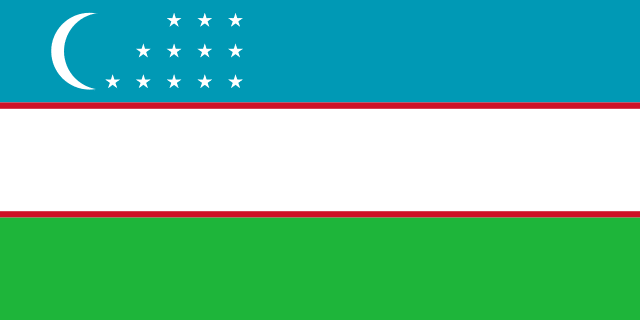Scholar-methodical job: Training and job with students is carried out according to the confirmed typical and working programs, and as under individual weekly and annual plans. Introduction of modern advanced foreign experience of teaching the CART, UNICEF, the TEACH-VIP the Project of Health II – PRT (problem-rough training). The Tutor on ophthalmology – tests of new generation for all levels (for students, masters and clinical interns and doctors) in three languages in a kind the Internet of page with the note on correct and wrong answers and with the link to sites corresponding the Internet. In the working program for every year have been renewe additions and changes like step-by-step consultations of patients with № 3 on № to 11 employments are brought, materials from the CART of the recommendation of the order № 155 are brought, materials from the order № 80 are brought, educational technologies on all employment are brought. Multimedia programs with situational problems, a model for research of pathologies of an eye bottom – for acquisition of skills ophthalmoscopy and differential diagnostics of pathologies of an eye bottom are successfully used a training apparatus for biomicroophthalmoscopy.
Discipline development is directed on formation of active clinical thinking at students taking into account necessity of the maximum individualization of clinical supervision and tactical actions. Training methods are spent – traditional: conversation, messages, answers to questions, and also interactive – clinical imitating game with use of methods “role game”, a “snowball”, “brain storm”, the decision of situational problems of various level of complexity, testing. Working out of schemes of pathogenesis developments of a critical status, diagnostic process, components of the urgent help methods of “presentations”, “round on gallery”, “the academic polemic.
In 2019 had been set training operational microscope for students of masters degree and for clinical residents. New technologies of training allow to solve actual problems of education and corresponds to time requirements, provide possibility to carry out training in conditions as much as possible approached by a real life, allow to co-ordinate a theoretical material to practical activities and to involve students in active independent informative process, provide formation and development professional and key competition. On chair following technologies of training are introduced: graphic organizers, designing and a case method.




Mission and Values of the Department of Ophthalmology and Pediatric Ophthalmology of TashPMI
Mission:
The mission of the Department of Ophthalmology and Pediatric Ophthalmology of TashPMI is to introduce innovative technologies in the field of ophthalmology, improve the quality of ophthalmologic care for the population, and foster the development of clinical thinking and scientific research skills among students, master’s students, and clinical residents.
Goals and Objectives
The goal of the master’s program in Pediatric Ophthalmology is to train highly qualified specialists who possess comprehensive knowledge, skills, and practical competencies required for modern ophthalmologic practice, in accordance with the standards of certification and subsequent licensing as professional specialists.
The master’s degree educational program in the specialty
70910206 – Ophthalmology, Pediatric Ophthalmology is based on the requirements of the State Compulsory Standard for medical specialties at the master’s level and the standard professional curriculum for medical master’s programs, approved by the orders of the Minister of Health.
Assessment of Master’s Students
The documents regulating the assessment criteria and methods for evaluating the knowledge of master’s students in the specialty “Ophthalmology” are the course syllabi for the subjects “Therapeutic Ophthalmology” and “Ophthalmic Surgery”, which are developed based on standard curricula.
The knowledge assessment criteria comply with Order No. 3069 of the Ministry of Higher and Secondary Specialized Education of the Republic of Uzbekistan dated September 26, 2018, “On the approval of the regulation on the system of knowledge control and assessment of students in higher educational institutions” https://lex.uz/ru/docs/3921757?ONDATE=28.07.2021&action=compare.




Master’s Students
The mission of TashPMI is connected with the development of high-quality medical care through the synergy of research, education, and clinical practice.
The main goal of TashPMI is to improve public health by integrating education, science, and clinical practice.
In the Republic of Uzbekistan, the policy for the selection and admission of master’s students is coordinated by the Ministry of Higher Education, Science and Innovation (formerly the Ministry of Higher and Secondary Specialized Education). This body is responsible for developing the legal and regulatory framework, approving admission quotas, overseeing the organization of entrance examinations, and ensuring equal access to education.
Teachers
Teachers selected for the master’s program must have an academic degree and the highest category as an ophthalmologist, capable of performing all types of surgical treatment for patients in ophthalmology.
Every year in June, TashPMI conducts an accreditation process, led by the Rector of the Institute, Professor B.T. Daminov, to fill the faculty positions for the upcoming academic year.
Educational Resources
TashPMI’s Department of Ophthalmology and Pediatric Ophthalmology has a modern material and technical base for the training of master’s students, which includes: classrooms, lecture halls, conference rooms, libraries, video systems for broadcasting from operating rooms to the lecture hall, information technology tools, a simulation classroom, and its own clinical base.
Agreements have been made with three medical organizations in Tashkent, two republican research institutes, and national scientific centers for the provision of clinical bases. All clinical bases are equipped with modern educational and medical-diagnostic equipment, ensuring the delivery of the educational process at a high professional level and the provision of highly qualified and specialized medical care to the population of Uzbekistan.
Rights of Master’s Students
During their studies, master’s students at the Department of Ophthalmology and Pediatric Ophthalmology at TashPMI have the following rights:
Ethical Behavior of Master’s Students
Upon admission to the master’s program at the Department of Ophthalmology and Pediatric Ophthalmology at TashPMI, seminars on ethical behavior of doctors towards patients are conducted. These seminars are based on and reinforced by various international and national documents, including the Geneva Declaration of the World Medical Association, the Helsinki Declaration, codes of professional ethics of medical organizations, and the legislation of individual countries (developed in 2017).



